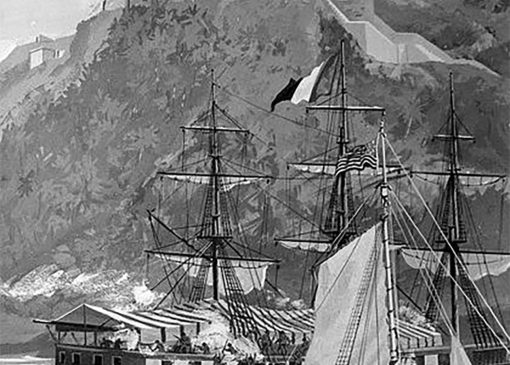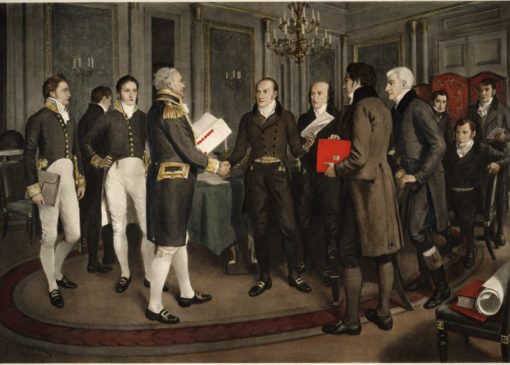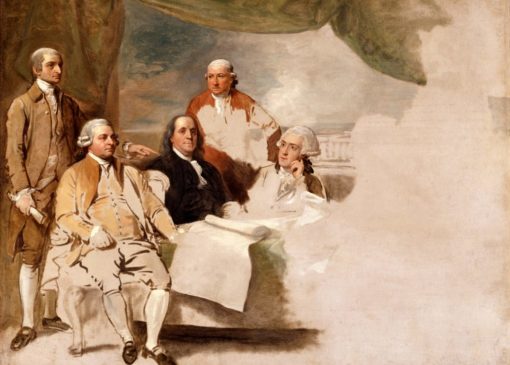*Editor’s Note: Chronicles of an American Diplomat: John Quincy Adams is a series following John Quincy Adams from his education at his father’s side through the American Founding Period, through to his own official embarkment on a diplomatic career, and the events that transpired during the era that he had to navigate. We know much of John Quincy Adams, and his times, from his massive writings, which collectively constitute an American Classic. This offers a chronicle of the opening of his public career from 1794-1801. The following is the sixth post in the series.
~*~*~*~
In Dispatch #5, after a fast but perilous crossing of the Atlantic, John Quincy arrived in England to deliver dispatches to special envoy John Jay and the regular minister, Thomas Pinckney, before assuming his post in the Dutch Republic. There was yet no information about the progress of Jay’s negotiations to resolve outstanding issues with Britain, which put the two countries on the brink of war. But John Quincy learned one piece of astonishing news — the radical government in France had been deposed and Robespierre and other leaders executed. This, while the French army continued to march northward against the Netherlands.
~*~*~*~
Monday, October 20, 1794. In the morning, John Quincy received his first glimpse at John Jay’s progress on the treaty. The Chief Justice and Pinckney showed him the current draft, which was apparently very far along. They began an article by article examination. The matter was so complex they adjourned until the next day.
In the evening he went to the Covenant Garden Theatre. The performance of the night was Romeo and Juliet, with a pantomime called Oscar and Malvina, the subject of which was taken from Ossian. In the interlude between the plays, the musicians struck up the tune of God Save the King. “Immediately, a thunder-clap of loud applause burst forth from every part of the house, and the whole audience rose. They continued standing for as much as ten minutes, while the tune was played, clapping their hands, and crying, bravo! bravo! with as much enthusiasm as they could have done, had they felt all the interest they pretended. Pure patriotism again. All for the service of their King and Country.” This put John Quincy in an awkward position, personally — “I am always averse to an appearance of singularity” — and diplomatically. He decided to stand, but “I was under no obligation to join in the applause, and I could not help disdaining the baseness of their servility.”[1]
Tuesday, October 21. After breakfast with Jay and Pinckney, the trio continued their examination of the draft treaty until three in the afternoon. They still had items to cover and adjourned to the following day. John Quincy wrote a letter to David Humphreys, the American minister in Portugal, informing him of his appointment to the Netherlands, and the fact that John Quincy’s predecessor, William Short, was to remain in Madrid — if Humphreys did not already know about these assignments. Humphreys would be responsible for using the new loan John Quincy hoped to obtain in Amsterdam in Humphrey’s negotiations with the Barbary regencies, specifically Algeria. John Quincy included a note expressing pleasure in renewing his acquaintance with Humphreys (a close associate of Washington), whom he knew in America.[2]
Wednesday, October 22, 1794. Jay, John Quincy, and Pinckney spent the morning finishing their review of the draft treaty as it then stood. It would last for ten years. The British agreed to evacuate the northwestern posts by June 1796, to grant the United States “most favored nation” status, and to permit limited trade with the British West Indies. The two governments would arbitrate three disputed matters: the eastern boundary of Maine; the claims of Americans to compensation for recent maritime seizures; and the claims of British merchants to debts held against American citizens prior to the Revolution (the United States would commit to pay legitimate claims).
The negotiations, however, ignored many of the hard problems or gave substantial ground to Britain. Jay essentially abandoned the Revolutionary era goal of freedom of the seas. He specifically set aside a critical element of John Adams’s Model Treaty of 1776 – free ships make free goods – which became an integral part of the 1778 commercial agreement with France, as well as in some of America’s other treaties. The draft moved considerably toward the preferred British definition of neutral rights. It defined foodstuffs as contraband if there was a reasonable expectation “of reducing the enemy by the want thereof,” and if compensation to neutral owners was paid. The United States also explicitly foreswore use of coercive economic instruments. The treaty did not address the issue of the British practice of impressment, or compensation for slaves allegedly seized by the British during the war, as stipulated in the 1783 peace treaty.
Jay and Pinckney admitted to John Quincy they thought the proposed treaty was “far from being satisfactory,” even with improvements they still had in mind to propose. All that said, they told John Quincy they believed it was still preferable to war. Jay asked John Quincy for his opinion.
John Quincy said he “suggested such ideas as occurred to me upon the subject. My observations were made with the diffidence which naturally arose from my situation; and were treated with all the attention, that I could expect or desire.”[3]
In fact, the new American minister was taken aback. “It is much below the standard which I think advantageous to the country.” John Quincy asked himself why a better deal could not have been made given Britain’s serious internal and external difficulties. He wondered whether no agreement would have been preferable to this one. But he was flattered by the confidence shown in him — Jay was under no obligation to bring him into the discussion. He was not prepared to challenge such a distinguished official, a friend and former diplomatic colleague of John Adams. John Quincy may not have been privy to Jay’s instructions and therefore could not judge how well he followed them. His experience, as the son of a diplomat, taught him the necessity of trusting a reliable man on the spot to judge what was possible. He reluctantly accepted Jay’s assessment that it was either this sort of accommodation with Britain or war.
John Quincy judged that three main provisions – 1) indemnification for maritime seizures through a process of adjudication, 2) delivery of the Northwest posts, and 3) some commerce with the British West Indies – satisfied American honor and interests, however minimally. As to the final point, “the commerce with their West India Islands, partially opened to us, will be of great importance, and indemnify us for the deprivation of the fur trade since the Treaty of Paris, as well as for the negroes carried away contrary to the engagement of the Treaty, at least as far as it respects the nation.” This was a way, he might have supposed even if Jay did not say so explicitly, to get around the slavery issue. Jay was an opponent of the institution. On the other hand, Pinckney, from South Carolina, was a slaveholder.
John Quincy did not record what exactly the draft stipulated about the terms of trade with the British West Indies. This later became a source of controversy.
As to the concessions in commerce and neutral rights, “we never shall obtain anything more favorable, so long as the principles of the Navigation Act are so obstinately adhered to in this country. This system is so much a favorite with the nation, that no Minister would dare depart from it. Indeed I have no idea that we shall ever obtain, by compact, a better footing for our Commerce with this country than that on which it now stands. And therefore, the shortness of time limited for the operation of this part of the compact [ten years] is, I think, beneficial to us.”
During the negotiations, Jay mentioned that Lord Loughborough, the Lord High Chancellor, proposed an article that in either country, the subjects or citizens of the other would be exempted from the disabilities of alienage. Jay thought this extremely liberal idea should be delayed to the future. Remarkably, this article was suggested by Alexander Wedderburn, the former solicitor-general who famously excoriated Benjamin Franklin during a Privy Council meeting in the Cockpit in 1775. Loughborough assured Jay that with separation from the former colonies now settled, his disposition was perfectly friendly towards America — “he thinks it for the interest of both countries to assimilate and draw together as much as possible; and that his sincere wishes are to facilitate the most liberal and amicable intercourse.”
This and other liberal ideas that Loughborough had put forward persuaded John Quincy he was sincere. “I think the intention of every man, who aims at leveling the barriers which perpetuate the unnecessary separation of Nations, and widen the distance between man and man, is at least deserving of applause.”
At dinner, in company with Jay, one of the guests disparaged the success of Lord Cornwallis in India, claiming he was not entitled to any credit for his work there. It was impossible for Cornwallis to fail. He went out with a force infinitely superior to any ever employed at that place, and the nations he subdued were totally unfit for war and unable to contend with European forces. Lord Clive had done a thousand times more with means incomparably smaller.
Jay told the guest that he undervalued the character of the Indians and said that he always had a regard for Tippoo Saib and his father Hyder Ali. “And for my part,” he added, “I always wished them success.” John Quincy was pleased that his opinion coincided with Jay’s.
When John Quincy returned to his lodgings, he began his first letters to America. He now had something substantive to report, if he chose to do so.[4]
Thursday, October 23, 1794. John Quincy began to prepare his first dispatch to Secretary of State Randolph, undoubtedly anxious to make a good first impression with his superior. He confirmed that he delivered the dispatches to Jay immediately upon arrival. (It turned out that Jay received letters from Randolph through other channels, dated up to September 5. John Quincy had departed from Boston on September 17).
John Quincy then went into a survey, per his instructions, of recent developments in Europe, beginning with recent French military successes and the advance against the Netherlands. Predictions that Amsterdam would be taken almost immediately did not prove out but seemed inevitable. The Dutch States General conferred extensive temporary powers on the ruling Stadtholder but the opposition Patriot Party, which had largely gone underground after being suppressed following the Prussian intervention in 1787, began to reappear in formidable strength. An English traveler recently returned from Amsterdam thought public opinion ran 7 to 1, in favor of the Patriots.
John Quincy was unable to discern if the Patriot Party was favorable to the French, or what their present objects were. There were petitions circulating in Amsterdam arguing against breaching the dikes and inundating the countryside, the traditional means of defense. The French declared war specifically against the Stadtholder, and it was uncertain how far the people of Holland would involve themselves in his quarrel – possibly they would demand abolition of the office or his expulsion from the country. Most Dutch did not want to be treated as a conquered province and so it was not improbable they would seek to negotiate a separate peace.
As to Prussia — its King, Frederick William II, directed such a large force against Poland that he was of little service to the Combined Powers against France, and his force did not succeed in Poland. Prussia was forced to raise the siege of Warsaw and was said to be faced with a formidable insurrection in its own dominions. The French had been equally successful in Spain and Sardinia. At this point, they might dictate their own terms of peace to all their enemies except Britain, and it was not improbable that at the opening of the ensuing campaign season, those two great rival nations would be the only remaining candidates in the field.
As to his own duties, John Quincy had not heard from the Amsterdam Bankers or Sylvanus Bourne, the American consul in that city, and so he was unsure of his status in Holland.
And finally, to the matter at hand — Jay’s draft treaty on which he’d been fully briefed. “On a subject of such importance I could not suppose myself competent to view in its extent the operation of the Treaty, and I could do little more than acquiesce in the sentiments” of his colleagues. “The terms on which the Ministry here will agree, are not satisfactory to them, but are in their opinion on the whole preferable to an inevitable war. As far as my own judgment is capable of going, I entirely agree with them. I presume the affair will now very soon be brought to a conclusion.”
In his first dip in the diplomatic waters, John Quincy could have stayed in the shallow end of the pool and said nothing on the matter, much less offered a judgment, however qualified. There is no indication that Randolph had asked him to review the situation or that Jay had suggested that he endorse his work. But he decided to put himself on the record.[5]
Of note — in his diary and correspondence at this time, John Quincy did not note any consideration of how France might respond to such an Anglo-American treaty.
~*~*~*~
A Note About the Construction: In attempting to provide chronicles of John Quincy’s early diplomatic career, we utilize his daily diary (journal) entries as the foundation but group these and other material so as to provide a coherent narrative, while still retaining an “as it happened” framework. For instance, he often reflects on events, and the contents of letters and documents, days after they occurred or were received. We provide footnotes to give the reader an accurate account of the sources and their dates.
Primary Sources
APM — Adams Family Papers, Microfilm Edition, Massachusetts Historical Society, with Reel Number. The indicated transcripts were prepared from this source.
DJQA — Diary, from the Memoirs of John Quincy Adams, comprising portions of his diary from 1795 to 1848, edited by Charles Francis Adams, volume 1.
DJQA (original manuscript). Material not included in the Charles Francis Adams printed version. The indicated transcripts were prepared from this source.
FOL — Founders Online, National Archives https://founders.archives.gov
LD/SE — Line-a-day and short entries from his diary, APM, and available online through the Massachusetts Historical Society. http://www.masshist.org/jqadiaries/php/ The indicated transcripts were prepared from this source.
WJQA — Writings of John Quincy Adams, edited by Worthington C. Ford.
[2] October 21, 1794, DJQA; JQA (London) to Humphreys, October 21, 1794, APM 127.
[3] JQA (London) to JA, October 23, 1794, WJQA and FOL.
[5] JQA (London) to Randolph, No. 1, October 22, 1794, APM 127. Given the length of these dispatches and letters, we assume the date reflects when the document was started, not necessarily completed, and sequence them in as appropriate. But based on the dating we assume he started this letter before that to his father, which follows.




